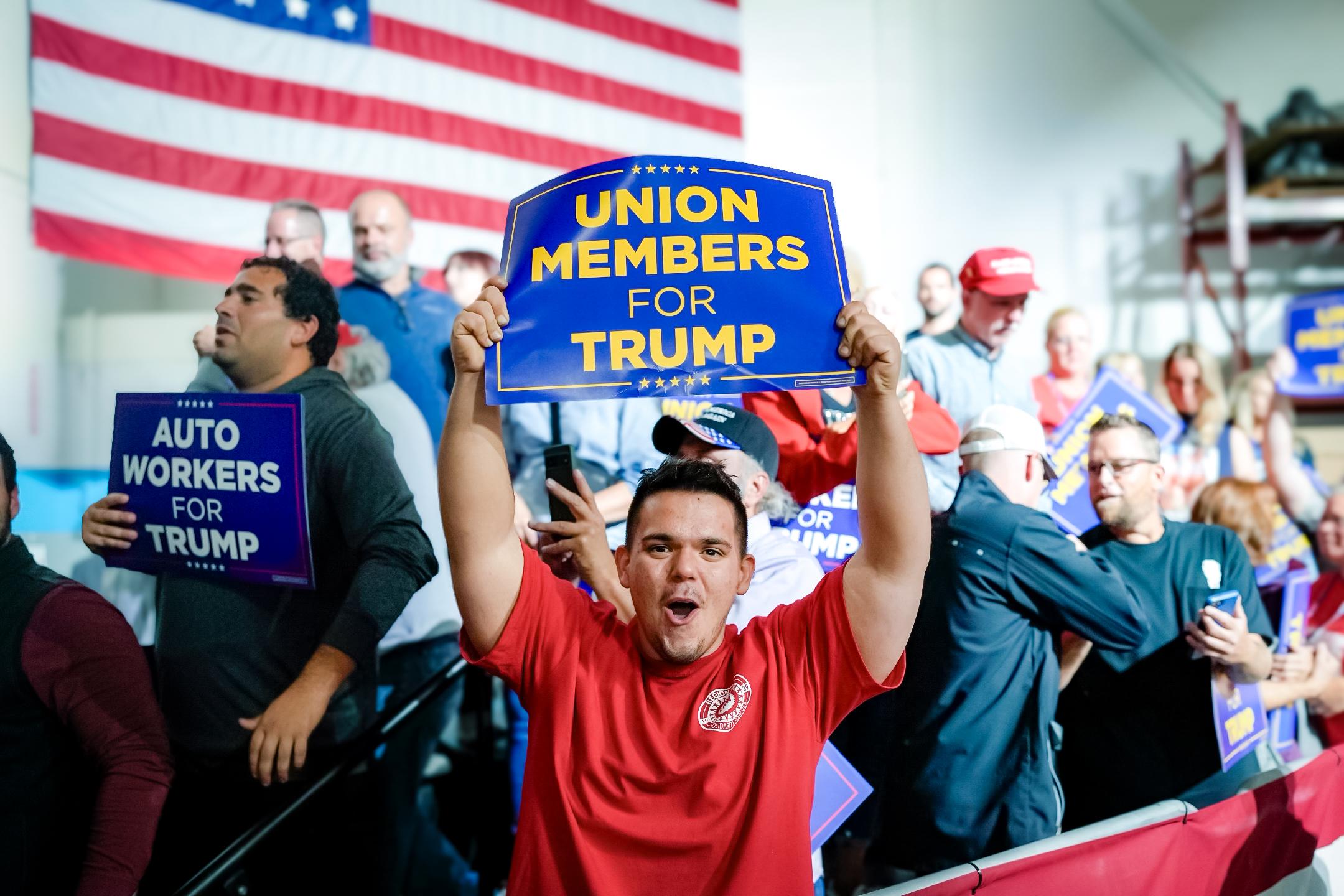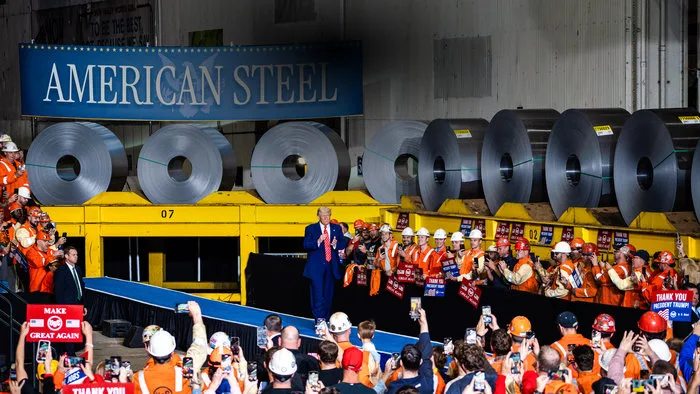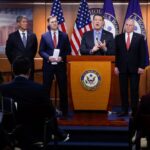By Emel Akan
WASHINGTON—On April 29, four weeks after introducing tariffs of at least 10 percent on nearly every country, President Donald Trump stood before a crowd of blue-collar workers in Michigan to mark his 100th day in office.
“After decades of politicians who destroyed Detroit to build up Beijing,” Trump said, “you finally have a champion for workers in the White House.”
Since his first term, Trump has broken with Republican Party orthodoxy, particularly on free trade and globalization. By championing steep tariffs and protectionist policies—cornerstones of his “America First” agenda—he has attracted a surprising new crowd to the party: union workers.
Republican National Committee member Shawn Steel said the GOP has become the party of the working class.
“What Trump has done, which is really intriguing to me, is he has taught Country Club, middle-class Republicans to work and align themselves with the working class,” he told The Epoch Times.
“That hasn’t happened in 120 years.”
Steel, a veteran party official from California, calls it a welcome change.
“Our party is doing better than the Democrats among working-class males,” he said.
“At one time, the Republican Party had farmers, merchants, ranchers, and working class people together—Trump has returned to that.”
Some have said that Trump has reshaped the Grand Old Party in ways that were once unimaginable. He has combined traditional Republican planks—such as tax cuts, deregulation, and boosting energy production—with policies often associated with the political left, including tariffs, TrumpRx, and government ownership in private companies.

Trump, however, avoids boxing his policies into a single ideology. He refers to them as “common sense” solutions. And a growing number of party members have rallied behind them.
“There are some areas where Trump has veered away from more orthodox, free-market conservative policies,” former Trump economic adviser Stephen Moore told The Epoch Times.
Moore praised Trump’s strong support for deregulation, his energy policy, and his tax cuts, describing them as a significant stimulus to the economy. However, he said he’s not a big fan of tariffs.

Historically, Republicans supported free trade, while Democrats favored protectionism.
From President Ronald Reagan through Trump, the GOP has consistently supported free trade, which has greatly benefited the United States, according to Moore. He estimated that the U.S. economy could grow at least half a percentage point faster without current tariffs.
Moore also said Trump’s tariffs on China are understandable given Beijing’s behavior. Still, he said the GOP should find a middle ground.
“If you want to isolate China, you have to have everybody else aboard, and so you don’t want to antagonize countries like Canada unnecessarily,” Moore said.
Steel said Republicans still hope the tariffs are temporary.
“The problem is we haven’t had free trade in decades,” Steel said, citing countries such as China that distort the world trade order with heavy subsidies and slave labor.
Trump’s trade agenda has faced legal challenges from businesses and states. On Nov. 5, the Supreme Court held arguments over the legality of Trump’s global tariffs.
Trump said on Nov. 6 that it would be “catastrophic” for the country if the high court were to rule against his tariffs. He said if he loses in court, he will develop an alternative plan to carry out his trade agenda.
New Era in Industrial Policy
Since taking office in January, Trump has also expanded government involvement in sectors critical for U.S. national security, a significant shift in industrial policy.
His administration has taken equity stakes in various companies, including semiconductor giant Intel, rare-earth element producer MP Materials, minerals miner Trilogy Metals, and Lithium Americas, which operates one of the world’s largest lithium mines in Nevada.

The federal government has also acquired a “golden share” in US Steel as part of a merger agreement with Japan’s Nippon Steel.
Additionally, Trump reached revenue-sharing deals with chipmakers Nvidia and Advanced Micro Devices.
Critics, however, view this as a new form of state capitalism.
John Berlau, senior fellow at the Competitive Enterprise Institute, a libertarian think tank, praised Trump’s long list of actions cutting red tape but said that his interventionist policies, such as taking ownership stakes in companies, “could detract from his good policies.”
During the Great Recession, the federal government under Presidents George W. Bush and Barack Obama purchased equity stakes in troubled banks and car companies, but those were only temporary measures.
Berlau said that when the government becomes the owner of a company, it can target its competitors and regulate the sector unfairly.

The Trump administration argues that the stakes are too high to ignore competition from China.
“We want to reduce U.S. dependence on imports of critical materials,” Energy Secretary Chris Wright said in response to a question from The Epoch Times during a press conference on Sept. 24 in New York City.
When asked whether the Trump administration would continue to expand the government’s stake in strategic sectors, Wright said, “Absolutely.”
Although the Trump administration prefers to leave investment decisions to private capital, he said, it will also invest in and support companies in developing critical mineral resources in the United States.
“We just made it so hard to mine anything here that we’ve hardly opened any new mines. We want to change that,” Wright said.

The Creation of TrumpRx
In another unprecedented move, the Trump administration recently negotiated a series of agreements with major pharmaceutical companies to lower the prices of drugs. The agreements resulted from Trump’s Most Favored Nation prescription price policy, initiated in May, which asked drugmakers to bring U.S. drug prices in line with the lowest prices paid by other nations.
On Sept. 30, Trump also announced the launch of TrumpRx.gov, a new website that will enable patients to find a drug and purchase it from the manufacturer at a discounted price. The website is expected to go live in 2026.
Even some liberal critics such as comedian and commentator Jon Stewart have acknowledged that the policies aren’t typical Republican policies.
On Oct. 21, Trump shared a clip on Truth Social from Stewart’s “The Daily Show.” In the clip, Stewart got Sen. Bernie Sanders (I-Vt.) to admit that Trump is implementing more of his policies than Democrats are willing to.
“You could almost make a case that the true inheritor of the Sanders revolution is Trump,” Stewart said. “He is the most socialist president of my lifetime.”

Sanders nodded as Stewart said: “Taking a percentage of companies to do business? That’s a Bernie Sanders idea. Doing TrumpRx—where the government is involved in selling pharmaceuticals? That’s a Bernie Sanders idea.”
“Yeah. That’s true,” Sanders said.
New Foreign Policy Approach
Domestically, Trump uses some interventionist policies to protect supply chains. In foreign affairs, however, his America First agenda departs from the interventionist approach that Republicans have supported for decades.
This has become more visible during a visit to the Gulf nations in May. Trump explicitly criticized U.S. involvement in nation-building and democracy promotion in the Middle East.
In a speech in Saudi Arabia, he mocked Western interventionists who give other countries “lectures on how to live.”

“In the end, the so-called nation-builders wrecked far more nations than they built,” Trump said.
Steel described Trump’s speech in the Middle East as “extremely pragmatic,” a stark departure from the neoconservative vision of spreading democracy by using military intervention that defined Bush’s presidency.
“The idea that the ancient tribal system, an ancient civilization that has not modernized, would readily adopt our democratic values turned out to be absolutely untrue,” Steel said.

Critics, however, have pointed to Trump’s attack on Iran’s nuclear facilities in June and said he contradicted his own non-interventionist approach.
According to Michael Walsh, a foreign policy expert, the America First policy does not oppose the use of military force.
“It’s about prudent use of force,” he told The Epoch Times. “Trump did something that was extremely risky, but he thought it was worth the payout.”
Walsh, a nonresident senior fellow at the Foreign Policy Research Institute, also said there has been a shift in geographic priorities under the Trump administration.
Unlike traditional neoconservatism, he said, the America First foreign policy prioritizes the Western Hemisphere as the main focus for the United States, and that’s why there is a significant investment “in protecting the homeland and the areas that are in close proximity to the homeland.”
Walsh said that explains the administration’s growing focus on Greenland and Venezuela.
What’s Next?
Trump’s policies have found strong support among blue-collar workers who once formed the backbone of the Democratic Party.

Exit polls from the 2024 election indicate that working-class voters (defined as those without a college degree) supported Trump over Vice President Kamala Harris by a margin of 56 to 42 percent.
Among white working-class voters, Trump led Harris by a margin of 66 to 32 percent. He also increased his share of working-class black and Latino voters compared with 2020.
Isaiah Goddard, a United Auto Workers member who works at Ford’s Rawsonville components plant in Michigan, said Trump’s tariffs are breathing life into the U.S. auto industry and that more auto manufacturing jobs are coming back to the United States.
Goddard, a third-generation autoworker, said he strongly supports Trump but does not feel loyalty to the Republican Party. He said he would “absolutely” vote for a Democrat in the future if that candidate were to advocate similar policies.

And this is a big issue for some Republicans who believe that if the party neglects working-class voters in the future, it could undo all the gains made in the Trump era.
Speaking at a dinner hosted by The American Spectator in May, Sen. Jim Banks (R-Ind.) said that Trump’s strong connection with blue-collar workers has been a gift for the GOP.
“Working class voters sent Trump back to the White House in 2024 with even more support than in 2016,” he said.
According to Banks, 79 percent of mechanics, 60 percent of small business owners, and 59 percent of custodians donated to Trump over then-presidential candidate Joe Biden in the 2020 election.
There are ongoing social and demographic changes in U.S. politics that affect the GOP’s priorities.

“Private unions were once very powerful in this country, and now they represent very few,” Steel said.
“At one time, there was no such thing as government unions; now they’re huge, and they can break the back of many states.”
Whether Trump’s policies and pro-worker vision will outlast his presidency remains an open question.
“Every single time we elect a president, we become the political arm of the President of the United States—whether you like it or not,” Steel said.
“Now that Trump is our president, it is, in fact, Trump’s party.”






